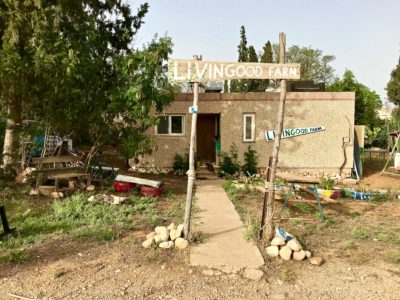Pushing past my comfort zone and learning about the unfamiliar world are two of my major goals for this year-long journey. Five days volunteering in the West Bank accomplished just that. I feel it important to state that this is not a political piece. I simply wish to share a perspective based on my experiences. However, it’s nearly impossible to do so without acknowledging the politics.
I was intrigued by the subject line, “Help at a date, olive and grape farm in the Jordan Valley, Israel” on Workaway.info, the global volunteer exchange site I use to search for volunteer opportunities. Little did I know the farm is located on one of the 130 controversial Israeli settlements in the West Bank.
LivinGood Farm is a fair trade, organic, kosher Medjool date, olive and grape farm. Ran and Eyal, my lovely hosts, are farmers on the moshav. They established the volunteer program three years ago, with the goal of providing volunteers with accommodations and food in exchange for work on the farm and other projects. During my stay, one of these included building a new volunteer house as the current one was recently purchased by a family.

We alternated days between construction and farming work, both of which were physically demanding. The temperature in the Jordan Valley was in the high 80s. My first day entailed pouring fifty pound bags of potassium chloride into a wagon and wheeling it around to fertilize the date palm trees. Another day involved pruning, tying and wrapping the leaves of the baby trees, which are needle sharp, in jute to protect them from the intense sun. At the end of the day, I was drenched in sweat, my body ached and my hands were full of puncture wounds. I felt incredibly accomplished.

Wanting to see more of the Jordan Valley, I decided to visit Jericho one afternoon after work with a fellow volunteer and friend, Karin from Brazil. Jericho, believed to be the oldest city in the world, is in area A of the West Bank. The moshav is in Area C, where Palestinians and Israelis coexist in a semi-segregated way with a complicated governance structure. That said, Palestinians and Israelis do coexist peacefully here. In fact, the nearest grocery store is an Arab market, from which most of the food for the volunteer house is purchased.
As soon as we left the gates of the moshav, Karin directed me to look for an Arab license plate. It was only then that I noticed the segregation – yellow background with black writing for Israelis and white background with green writing for Palestinians. We were hitchhiking to Jericho. I recognize this sounds completely insane, but try to understand that this is just what you do in this region. Karin, being well-travelled, was a pro and I decided to go along for the ride (pun intended). We waited at the main junction outside the moshav and within minutes, a friendly looking middle-aged Palestinian man driving offered us a ride. We had a perfectly safe and pleasurable experience.
The week went by quickly. Sadly, just as I became proficient in mixing cement, building walls and pruning trees, I reached the end of my stay. Eyal was kind enough to drive me to a bus station closer to Tel Aviv. The long car ride provided the opportunity to elicit his perspective on living in the West Bank under the current conditions.
He shared that he has many Palestinian friends. In fact, one of his employees on the farm is Palestinian, not an uncommon scenario in area C. According to Eyal, his friends often invite him to area A. He isn’t afraid to go even though it is illegal for Israelis to enter. The only thing that stops him is the possibility that Israeli soldiers would have to come into to the region as a result. Having too much respect for the soldiers, he doesn’t want to be responsible for putting them in that position.
Eyal then shared a story that, for me, highlights the essence of how this conflict impinges on the everyday lives of good people. He has a good Palestinian friend, a talented electrician, who did the electrical work for his house on the moshav. About six months ago, this friend’s uncle stabbed and killed an Israeli man. Because the friend is a direct relative, his documents are now marked and he can no longer enter Israeli territory. “He didn’t do anything wrong. He’s a really good man.”, declared Eyal.
Over the past few weeks, tensions have risen as the US prepares to move the US embassy to Jerusalem and, two days ago, announced pulling out of the Iran Deal in contrast to its European allies. Cities in the West Bank are preparing for protests.
This experience taught me one major lesson. Most of the world outside has never stepped foot in this region. Yet, in many ways, it has stimulated more tension than the people living within it as Israelis and Palestinians are each vying for international approval and validation. I now believe strongly that to have a an opinion or judgement, one must first spend a significant period of time living in the region to understand the landscape at more than a superficial level.
“There are problems everywhere in the world.”, said Eyal. “As long as the sun comes up in the morning, I’m happy.” This is his mantra. I will carry these wise words with me into the future.




